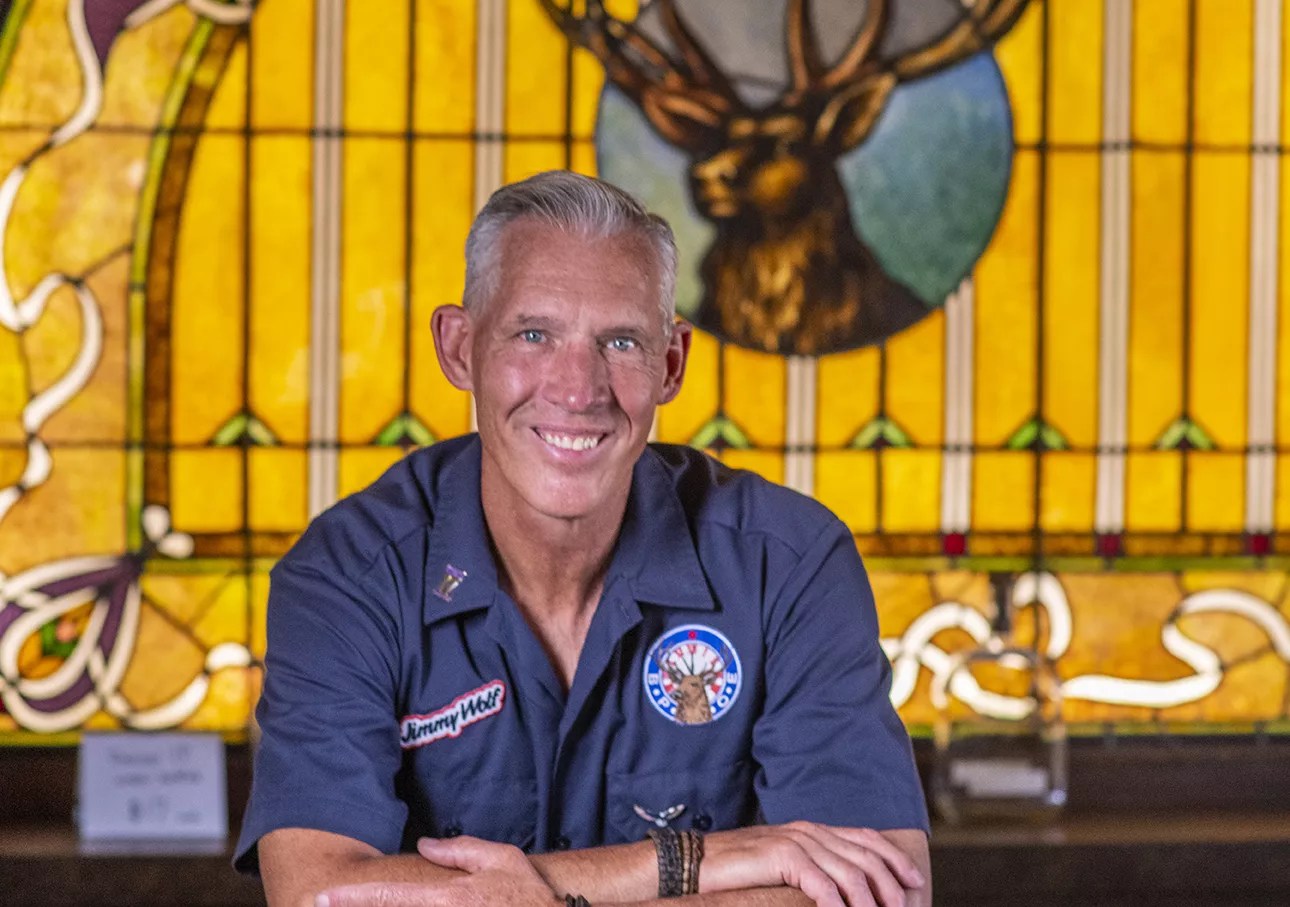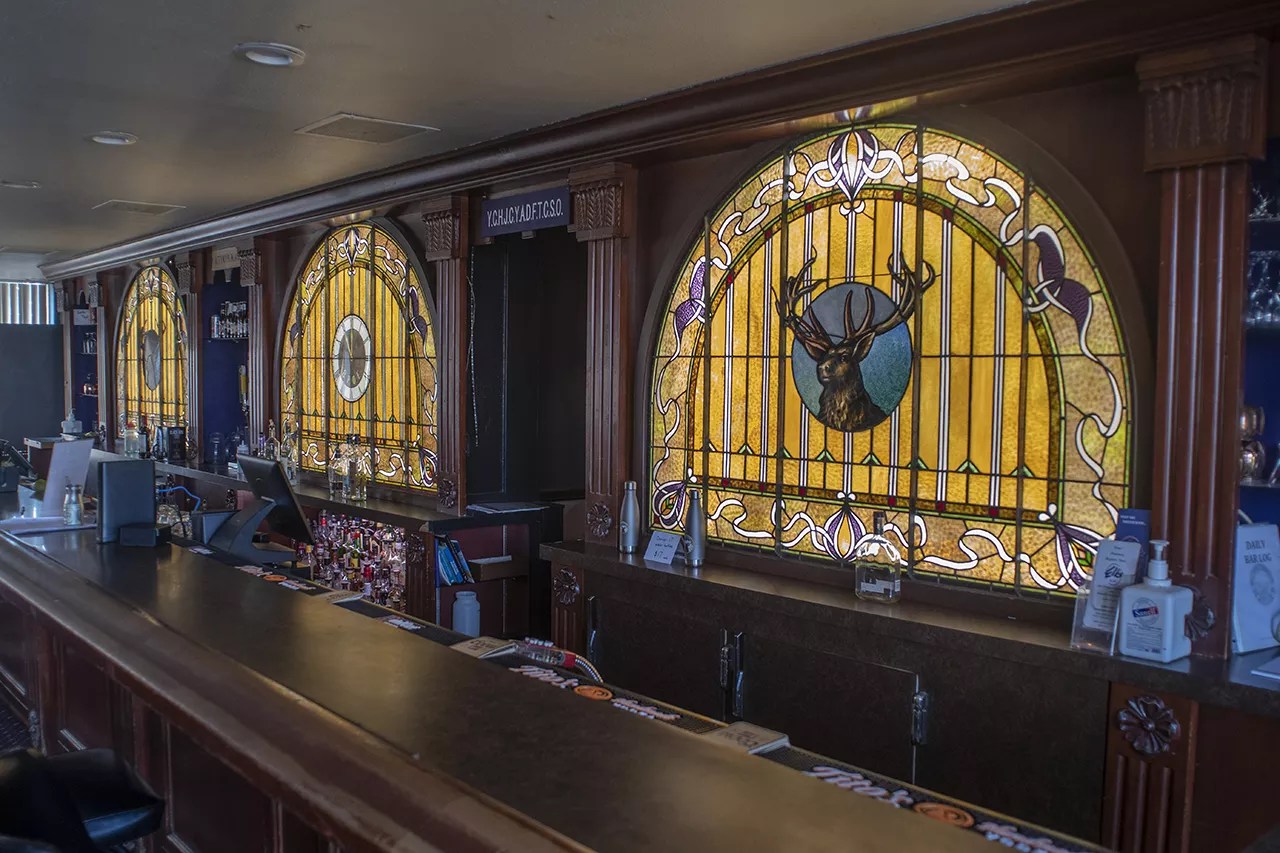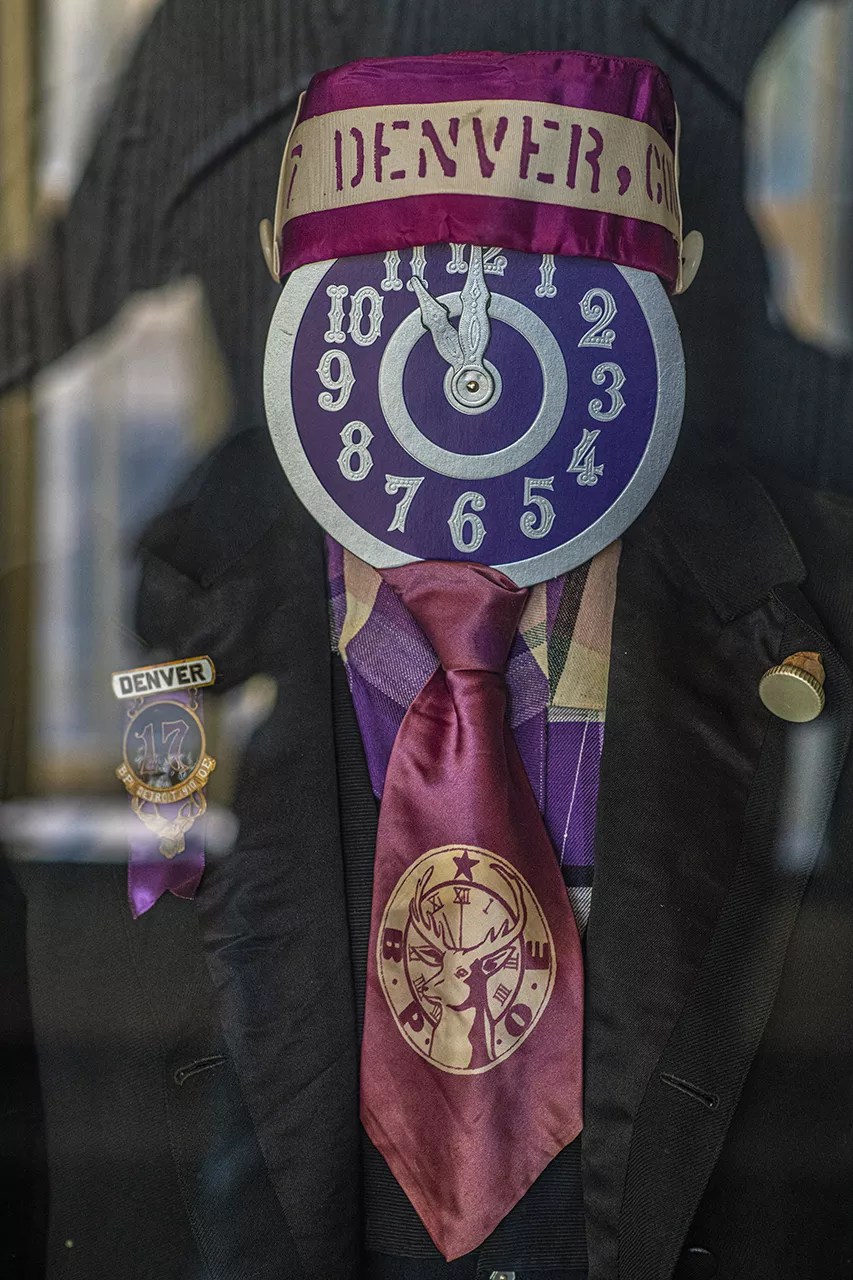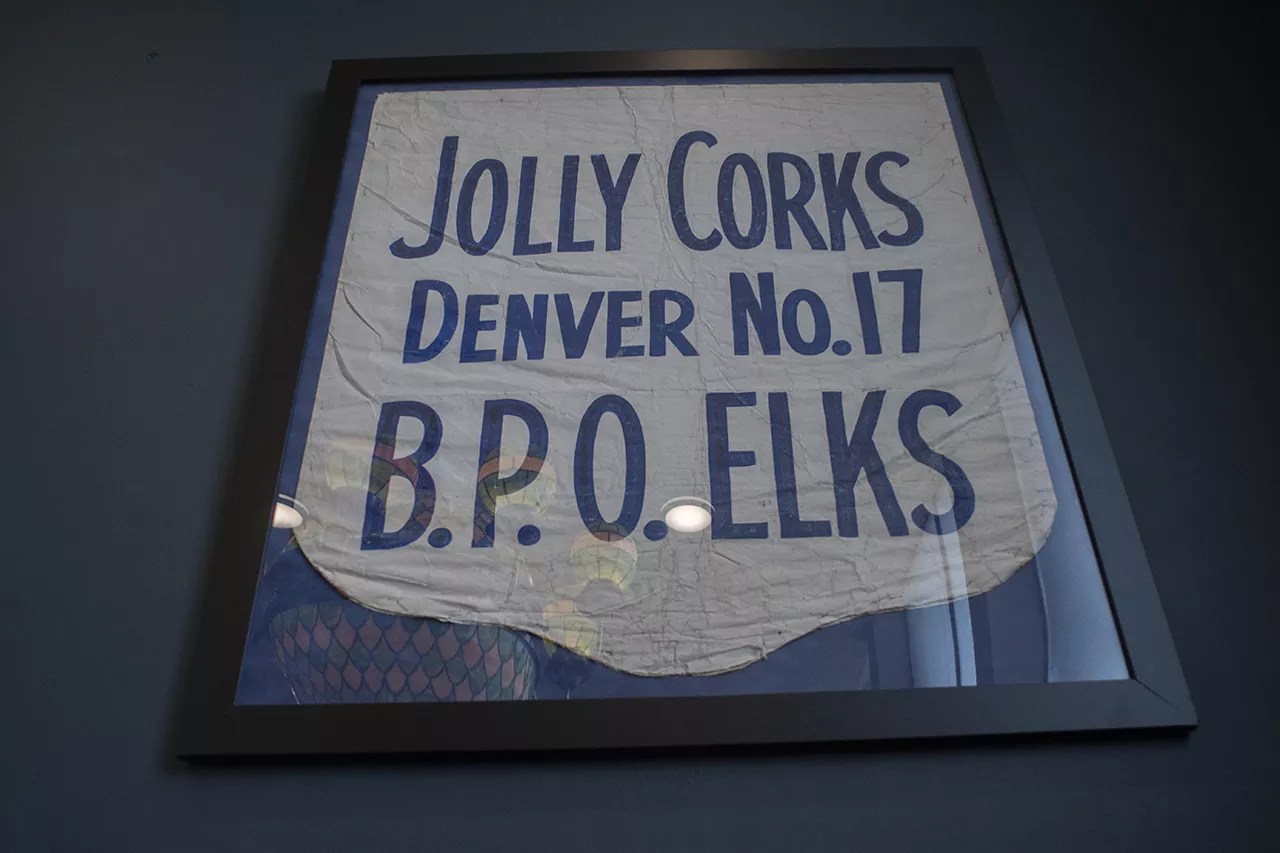
Evan Semón

Audio By Carbonatix
On a sunny Friday afternoon in August, a usually quiet parking lot in Jefferson Park is filled with vintage cars and motorcycles, the sounds of a live band warming up, and smoke from a grill cooking up burgers and hot dogs for an eager crowd. Is it a pop-up? A tailgate party? No, it’s the Denver branch of the Benevolent and Protective Order of the Elks of the United States, hosting a classic car show to attract potential members.
Denver Elks Lodge 17 moved into its current home at 2475 West 26th Avenue back in 1973, when the place was a granary and this part of Highland was far from a hot spot. Pieces of the original building, from stained glass and chandeliers to the entire bar top, still account for a good chunk of the decor today. But outside, things have changed. The purple sign declaring that this is Denver Elks Lodge 17 is new, and there are far more impressive developments in the neighborhood. For starters, the block across the street that once held La Loma recently sold for upwards of $30 million. But Denver Elks Lodge 17 has no plans to move.
Its members have worked too hard to get here.

A photo of the Denver Elks membership in the early 1900s, when the lodge was downtown.
Evan Semón
The Benevolent and Protective Order of the Elks got its start in 1867, when British comic and entertainer Charles Algernon Sidney Vivian founded the group in New York City. Originally dubbed the Jolly Corks, it began as a social club for actors, comics, minstrel players, musicians and other entertainers who met to drink privately on Sundays when other bars were closed. Because many of these original members were traveling entertainers, word of the club spread quickly across the country, and the demand for more branches grew. The club expanded to include other professions, too, and so was officially renamed the Benevolent and Protective Order of the Elks in 1868, about a year after the first meeting.
The BPO Elks originally borrowed many rites and traditions from the Freemasons, an older international fraternal order, but abandoned most of those in the early 1900s in hopes of creating their own identity. The Elks were founded “to promote and practice the four cardinal virtues of Charity, Justice, Brotherly Love, and Fidelity,” according to their purpose statement. The membership-based social club has charity as its guiding principle, and while it’s non-political and non-sectarian, members must believe in God and have a strong sense of patriotism. Potential members must also be American citizens, “of good moral character,” and older than 21.
Compared to the Freemasons and the Knights of Columbus, which both still only allow males to be members, the Elks are far more inclusive. But the Elks did start as a club exclusively for white men (some of whom frequently performed in blackface), and when the organization ultimately accepted women and people of color as members, it was not without protest. The “whites-only” clause in the Elks bylaws was repealed in 1973, after three previous attempts failed and certain leaders who supported integration were expelled. In 1993, a Utah Supreme Court ruling mandated that the Elks must begin to accept female members or they would lose their liquor licenses. It took two years after that ruling for the “all-male” clause to actually be removed from membership requirements. And as of 1979, members could not be affiliated with the Communist Party.
In June 2020, the Elks reported a membership of nearly a million people. As a not-for-profit American fraternity, the BPO Elks host weekly meetings in some 2,000 lodges nationwide. Although every lodge follows the guidelines set by the Grand Lodge in Chicago, annual membership dues can range from $50 to thousands of dollars, based on the upkeep cost of individual lodge amenities. For example, the dues at Denver 17 are $107 a year, but dues in Boulder and Colorado Springs are higher, because those lodges have swimming pools and other costly facilities. There are 55 Elks lodges throughout Colorado, catering to roughly 21,421 Elks, but only one in Denver County. Established in 1883, with its first home on 17th Street, Denver 17 is known as the “Mother Lodge of the Rockies.”
Over the past few years, it’s also developed a reputation as one of the fastest-growing branches in the country.

The Jolly Corks bar at the Denver lodge.
Evan Semón
When Jim Wolf joined the Elks five years ago, he made it his mission to dispel the myth that this was an exclusive club for white men.
Wolf – a white man – had never imagined that he would be an Elks member himself. But while attending a fundraiser that the lodge hosted for Skinner Middle School, he was invited to apply. “A lot of us parents who are now members came to that school fundraiser,” he recalls. “One of the older members who was bartending that night approached several of us, saying that we should become members. And my wife, being very active in the neighborhood, saw the potential here for the community space. Basically, our wives were like, ‘You should join this.’ So a lot of our friends all joined at one time, and we started going to every barbecue and school fundraiser and said, ‘This place is kind of great, if we just put some love into it.'”
Wolf quickly became a trustee on the lodge’s board of directors. In 2019, he wrote a diversity statement that he proposed adding to the lodge bylaws, clarifying certain misleading aspects of Elkdom. “A question we get asked a lot when we approach women to join is, ‘I thought that was a men’s club.’ We’re really trying hard to dispel that,” he says. “This is not a men’s club; it very much is open to everyone, and that was a really strong push for our diversity statement – to say we’re completely inclusive of everyone – and we’ve got to get this out so we don’t have to keep answering that question.”
The diversity statement, which was officially added to the Denver Elks Lodge 17 bylaws in June, also clarifies that while membership requirements do include a belief in God, people from all religions are welcome to join. “When we say ‘Believe in God,’ the way Denver 17 has approached it is, we don’t define God,” Wolf explains. “It has more to do with the oath we take to uphold the Constitution. It’s like going into court and taking an oath. If you don’t believe in anything, it’s an empty oath. You need to believe in something greater than the self, but we don’t define what your god is.”
All new members are informed that political or religious discussions are not allowed within Elks lodges. “The Elks is a communal space to be free and neutral, and it’s strictly prohibited and discouraged to discuss those things. We want everyone to be able to feel they can come in here, commune with their fellow Elks and their community, and not have all that extracurricular stuff coming in,” says longtime Colorado Elk Mark Bolson.
Bolson had to enforce this policy at another lodge. “When I was over at Westminster as Exalted Ruler, it was the night that Clinton got elected, the first time,” he recalls. “Before the meeting, I went up to the bartender and said, ‘Turn off the TVs. Every single TV. If you want to know what happened with the election, go home.’ Because it’s an opportunity for discussions to get animated, and it’s not allowed.”
Bolson had been a member and leader at several Colorado lodges before joining Denver 17, where he quickly became the go-to guide for the lodge’s newer members. Traditionally, a lodge’s Exalted Ruler holds every lower position before being elected to the highest office, a process that takes seven years. However, when Wolf joined Denver 17, there were so few active members that elevating someone who had followed the traditional leadership path wasn’t an option. Impressed by the leadership skills that Wolf had shown during his short time as a trustee, his colleagues nominated him to be Exalted Ruler for 2020. “As a result of me taking that leadership and kind of being one of the first ones in,” he says, “and then also being an attorney, I think our membership saw that I might be a good Exalted Ruler and said, ‘Why don’t you run with it, and we can set up a group of leaders that we’re trying to bring in?”’
“We want everyone to be able to feel they can come in here, commune with their fellow Elks and their community.”
Making the jump from trustee to Exalted Ruler wasn’t easy, but Wolf had help from past Exalted Rulers like Bolson. “Mark’s been really instrumental in helping us along and learning the history of the Elks and what it means to be a good Elk, what the history of Elkdom means, and how we can carry it from there,” Wolf says.
Clarifies Bolson: “It’s actually in Grand Lodge statutes that we are there to aid and assist the current officers. We take that charge very importantly.”
One of the first things that Wolf did as Exalted Ruler was honor the Elks who had come before him, making Denver 17’s three first female members honorary lifetime members. (In addition to the prestige, honorary members also enjoy discounted annual dues.) The three women, who were known as Elkettes before women were admitted to the Elks, were finally allowed to join officially in 1995 and are still active members today. Recognizing their contributions was part of Wolf’s push to change the white-male face of the Elks.
This year, his original 2019 diversity statement was updated to include a paragraph condemning any sort of harassment or discrimination at lodge meetings and in hiring practices. “It’s something that was very important to me when I came in here,” he says. “I wrote it, and now I’ve rewritten it in its current form. I’m very excited by this, and very passionate about this.”
He’s also quick to fix oversights. Informed that the national Elks website, the Colorado Elks Association website and the Denver 17 website all failed to offer any history of women and people of color joining the Elks, Wolf and his colleagues agreed that it was important to recognize these landmark changes. “We established in 1883, and it was a white man’s organization for many years. Not until 1995 were women allowed to join, and it was because of a lawsuit,” he says. “So we know that history, and we want to make sure that we know our history so we don’t repeat it. Push the diversity, talk about what was the history and why we changed, and that we recognize that but we’re not about that. We’re about growing and moving forward.” Within a few days of learning of the omission, Wolf had Denver 17’s website updated to include an honest and complete history of the Elks’ reluctant diversification.
Newer female members at Denver 17, including Wolf’s wife, Lauren, have now partnered with longtime female Elks on an ongoing project to explore and elaborate on the history of women in the BPO Elks.
Denver 17’s commitment to openness, transparency and inclusion has helped the lodge grow exponentially in recent years. Today’s membership is larger, younger, more active and more geographically diverse than it was when Wolf and his friends joined. “There’s very strong Elks in Lakewood, Westminster, Northglenn, Golden and Littleton, and so all those lodges had a head start on us,” he says. “They’ve been active, with large, active memberships, for many years. What we’ve really done in the past couple years is, we’re the fastest-growing lodge in Colorado and one of the fastest-growing lodges in the nation. We’re the youngest lodge in all of Colorado, and the second-youngest of the top ten growing lodges nationally.”
In 2020, Grand Lodge gave Denver 17 an award for bringing in the most new members (by percentage of growth) out of all the lodges in the country.
And the lodge has grown not only in numbers, but in member activity. “We’ve really grown our active membership from a core of twelve that are still extremely active. We have 50 to 75 active members now that are in some way participating and driving what our mission of Denver 17 has become. The mission really is to be that community center, increase the diversity of our membership and continue our outreach,” notes Wolf.
Denver 17 has gained many female members, as well as individuals representing the LGBTQ community. “We have a lot of members that have come and spoken to me personally about the diversity statement,” Wolf says. “We have a sizable group of members of the LGBTQ community, and it’s very important to them. We had a celebration in June over Pride weekend, and we had a really super turnout. That makes me feel good, that we’re doing the right things, and we’re getting really good Elks as a result of that.”

Memorabilia displayed at the Denver Elks Lodge 17.
Evan Semón
The diversity statement was a start, but Wolf has learned that the best way to encourage growth is to modernize lodge activities while still leaning on the traditions of community outreach and charity upon which the Elks were founded. By focusing on youth outreach and fundraising for local schools, Denver 17 has successfully attracted young parents to join. “We bring our kids here a lot, and we very much encourage everyone to make this a family lodge,” he says. “We’re teaching youth what it means to be a part of a community. We’ve really become a communal hub for northwest Denver, and we need to now take what we’re doing here and outreach into central and downtown Denver, and southeast and northeast Denver.”
Through their Americanism committee – something that all Elks clubs must have – the Denver Elks work with local Scout troops and hold essay contests to help instill a sense of patriotism in today’s youth. Denver 17’s Drug Awareness Program, which aims to teach kids and their parents about the dangers of drug use (including legalized cannabis), is the only one nationally recognized and sanctioned by the U.S.
government. Everything Denver 17 does, from raising funds for local food banks and the Colorado Special Olympics to working with various veterans associations and starting a scholarship fund, is designed to further the mission of improving the quality of life for the entire community.
The Denver Elks have a particular affinity for nearby North High School, and many members have children who attend that school. So when Denver 17 was trying to figure out what to do with an empty basement space last year, the group decided to build a golf simulation lab and give the North High golf team an all-access pass. “The golf coaches at North High are members here, and so we brainstormed,” Wolf says. “We had an empty space, and we decided to do that. That’s for the boys’ and girls’ golf teams. They get utilization of that space, before any of our membership or anything, so that they can compete with the suburban golf teams that have access to golf courses. Here in urban Denver, and especially north Denver, our kids don’t have that same advantage.”
“We bring our kids here a lot, and we very much encourage everyone to make this a family lodge.”
The members have also built an outdoor beer garden to entice people walking by, have started hosting DJ nights, and have renovated the lodge’s interior to make it more appealing to a younger demographic. “I think the way that you grow membership, and the way you modernize so that you’re appealing to younger people and people who have no knowledge of the Elks, is that you have to make it fun,” Wolf explains. “Everybody is looking for their precious spare time, so when they go somewhere, they don’t want to go anywhere that’s threatening, anywhere they feel uncomfortable. They just want to go somewhere that’s extremely comfortable, where they have a great time. And then the added benefit of the Elks: We have a great cornerstone mission of charity behind everything we do.”
Those efforts don’t stop at their own lodge. This month, the diversity statement authored by Wolf will become a part of the official Colorado Elks Association bylaws and be adopted by all 55 Elks lodges in Colorado. After that, they’ll make a motion to the Grand Lodge to amend the national Elks bylaws; if their push is successful, the Denver diversity and harassment clause could be adopted across the country by next July.
And in the meantime, Wolf, who never even thought he would join an organization like the Elks, is continuing to encourage membership in Denver. “We’ve been growing by about an average of 100 new members a year the last couple of years,” he says. “And I think we can hit 150 by the end of this year.”

The Elks got their start as the Jolly Corks.
Evan Semón
The August classic car show was a trial run. But on any given Thursday or Friday night, the Denver Elks lodge is hopping.
Outside, a group of dads might be taking full advantage of the new beer garden, enjoying live music from a band or DJ. Upstairs, a young mom in overalls could be scooping her toddler off the pool table so that two teenagers can play. New members might stop to admire walls of photographs commemorating past Denver 17 leaders while exploring the lodge. And several members are certain to have bellied up to the Jolly Corks Bar for stiff drinks and camaraderie.
For Wolf, there’s nowhere else like it in town. “There might be an eighty-year-old person that you can sit down with and have a conversation over dinner or at the bar, and where else can you find this, where they welcome you with open arms?” he asks. “You won’t feel like a stranger in an Elks lodge.”